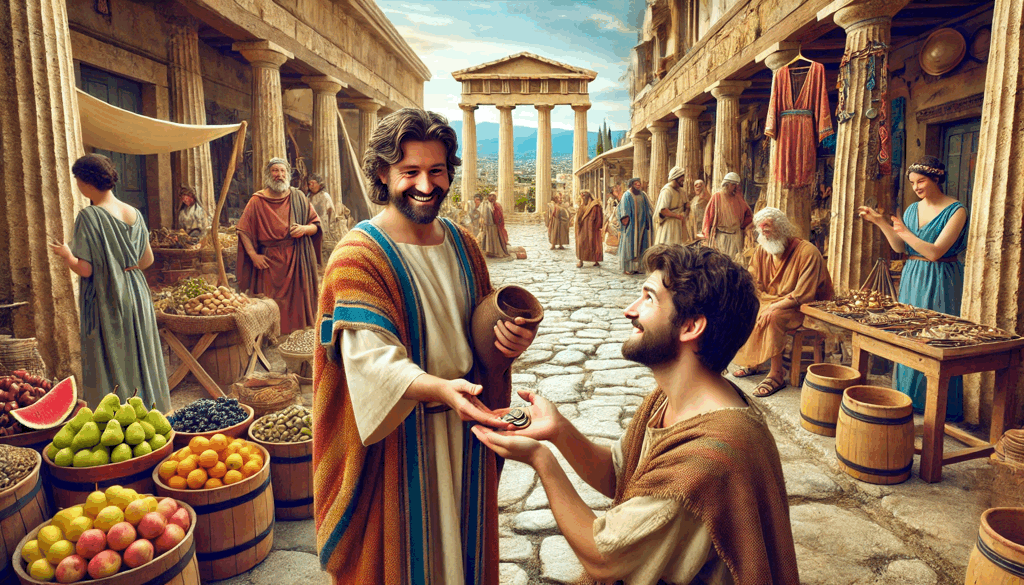Generosity is an act of trust, a reflection of gratitude, and a gateway to deeper relationships—with God, with others, and even with ourselves. Yet, it’s often a topic that stirs discomfort, especially when discussed in church settings. In 2 Corinthians 9, the Apostle Paul shares a powerful perspective on giving, one that challenges us to move beyond obligation and into joy. His words resonate as much today as they did in Corinth, calling us to become cheerful givers who sow seeds of kindness and reap blessings in abundance.
This article unpacks the key teachings of 2 Corinthians 9, applying them to modern life and offering practical takeaways for cultivating a generous heart.
The Context of Paul’s Message: Giving Beyond Borders
Paul’s letter to the Corinthians comes at a time of need. The church in Jerusalem is struggling, and Paul is organizing a collection to support them. While the Corinthians had previously demonstrated enthusiasm for giving, Paul’s letter aims to inspire them to follow through, not out of pressure but from a place of joyful willingness.
Paul’s approach is both pastoral and strategic. He highlights the Macedonians—who, despite their poverty, gave sacrificially—as an example of generosity born out of grace. By doing so, Paul underscores that generosity isn’t about wealth but about the heart.
Key Teachings from 2 Corinthians 9
1. Generosity is a Matter of Trust
Paul opens with the famous metaphor of sowing and reaping: “Whoever sows sparingly will also reap sparingly, and whoever sows bountifully will also reap bountifully.” This agricultural analogy, universally understood in Paul’s time and still relevant today, conveys a profound spiritual truth: what we give shapes what we receive.
For many, this teaching challenges our comfort zones. Giving generously requires trust that God will provide. It’s a reminder that true generosity is an act of faith, one that acknowledges God as the ultimate source of our resources.
2. God Loves a Cheerful Giver
The heart of Paul’s message lies in this statement: “God loves a cheerful giver.” Giving isn’t merely about the act—it’s about the attitude. A cheerful giver isn’t coerced or guilted into parting with their resources. Instead, they give freely, with joy and gratitude.
In modern terms, cheerful giving is about aligning our actions with our values. When we give out of love and thankfulness, we reflect God’s character and experience the joy of participating in His work.
3. Giving Multiplies Blessings
Paul reassures the Corinthians that generosity doesn’t lead to lack. “God is able to make all grace abound to you,” he writes, “so that having all sufficiency in all things at all times, you may abound in every good work.”
This promise isn’t about material wealth—it’s about spiritual enrichment and the grace to continue giving. Generosity sets off a cycle: when we give, we are blessed, and those blessings enable us to give even more. It’s a cycle rooted in God’s abundant provision.
4. Generosity is a Form of Worship
Paul links giving to thanksgiving and the glorification of God. He emphasizes that acts of generosity not only meet the needs of others but also result in praise to God. In essence, giving is an act of worship—a tangible expression of our gratitude for God’s blessings.
This perspective reframes generosity as more than a transaction. It’s a way to reflect God’s character and spread His love, making it a powerful testimony of faith.
Applying Paul’s Teachings to Modern Life
Paul’s teachings are as relevant today as they were in Corinth. Here’s how we can live out these principles in our daily lives:
1. Reframe Your Perspective on Generosity
Instead of seeing giving as a loss, view it as an investment in God’s kingdom. Whether you’re giving to your church, a charity, or someone in need, trust that your generosity will have ripple effects far beyond what you can see.
2. Start Where You Are
Generosity isn’t about the amount; it’s about the heart. If giving feels overwhelming, start small. Even a modest act of kindness can have a profound impact when done with love.
3. Trust God with Your Resources
One of the greatest barriers to giving is fear—fear that we won’t have enough left for ourselves. Paul’s assurance that God will provide invites us to take a step of faith. Trusting God with our resources allows us to experience His sufficiency in ways we never could on our own.
4. Expand Your Definition of Giving
Generosity isn’t limited to money. Your time, talents, and presence can be just as valuable. Volunteer at a local organization, mentor someone in need, or simply lend a listening ear. Every act of giving is a seed sown in faith.
A Personal Reflection: Cultivating a Cheerful Heart
Generosity often reveals our trust issues. For some, like Paul’s audience in wealthy Corinth, abundance can make giving harder. The fear of losing what we’ve worked for can overshadow the joy of giving. For others, like the Macedonians, scarcity makes giving an act of profound faith.
Paul’s teachings invite us to confront these fears and embrace a relationship with God that’s rooted in trust. As we grow in our faith, we find that generosity becomes less about what we’re giving up and more about what we’re gaining—a closer relationship with God, a deeper connection with others, and the joy of participating in His work.
Conclusion: Sowing Seeds of Grace
2 Corinthians 9 challenges us to rethink our approach to generosity. It’s not about obligation or guilt but about trust, joy, and worship. As we cultivate the heart of a cheerful giver, we participate in God’s cycle of abundance, where blessings flow freely and multiply.
So, what seeds will you sow today? Whether it’s through financial giving, acts of service, or simple kindness, trust that God will use your generosity to bring about a harvest of grace and goodness. And in doing so, you’ll not only bless others but also experience the joy of living out the Gospel in tangible ways.

